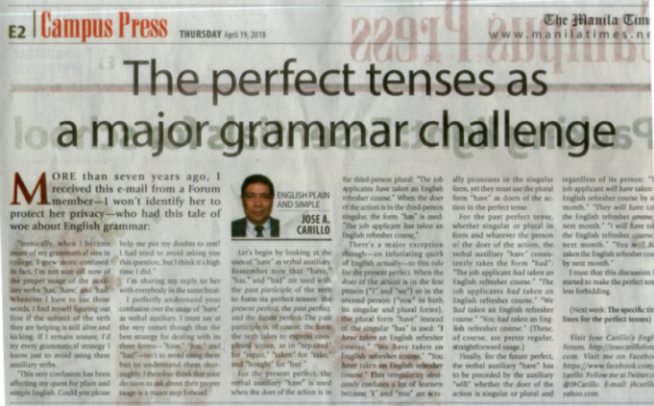More than seven years ago, I received this e-mail from a Forum member—I won’t identify her to protect her privacy—who had this tale of woe about English grammar:
“Ironically, when I became aware of my grammatical sins in college, I grew more confused. In fact, I’m not sure till now of the proper usage of the auxiliary verbs ‘has,’ ‘have,’ and ‘had.’ Whenever I have to use those words, I find myself figuring out first if the subject of the verb they are helping is still alive and kicking. If I remain unsure, I’d try every grammatical strategy I know just to avoid using these auxiliary verbs.
“This very confusion has been affecting my quest for plain and simple English. Could you please help me put my doubts to rest? I had tried to avoid asking you this question, but I think it’s high time I did.”
I’m sharing my reply to her with everybody in the same boat:
I perfectly understand your confusion over the usage of “have” as verbal auxiliary. I must say at the very outset though that the best strategy for dealing with its three forms—“have,” “has,” and “had”—isn’t to avoid using them but to understand them thoroughly. I therefore think that your decision to ask about their proper usage is a major step forward.
THE THREE FORMS OF “HAVE” AS VERBAL AUXILIARY
Let’s begin by looking at the uses of “have” as verbal auxiliary. Remember now that its three forms—“have,” “has,” and “had”—are used with the past participle of the operative verb to form its
perfect tenses:
the present perfect,
the past perfect, and
the future perfect. The
past participle is, of course, the form the operative verb takes to express completed action, as in “repaired” for “repair,” “taken” for “take,” and “bought” for “buy.”
THE PERFECT TENSES USE A FORM OF "HAVE” IN TANDEM WITH THE PAST PARTICIPLE OF THE VERB
For the present perfect, the verbal auxiliary “have” is used when the doer of the action is in the third-person plural: “The job applicants
have taken an English refresher course.” When the doer of the action is in the third-person singular, the form “has” is used: “The job applicant
has taken an English refresher course.”
There’s a major exception though—an infuriating quirk of English actually—to this rule for the present perfect. When the doer of the action is in the first person (“I” and “we”) or in the second person (“you” in both its singular and plural forms), the plural form “have” instead of the singular “has” is used: “
I have taken an English refresher course.” “
We have taken an English refresher course.” “
You have taken an English refresher course.” This irregularity obviously confuses a lot of learners because “I” and “you” are actually pronouns in the singular form, yet they must use the plural form “have” as doers of the action in the perfect tense.
For the past perfect tense, whether singular or plural in form and whatever the person of the doer of the action, the verbal auxiliary “have” consistently takes the form “had”: “
The job applicant had taken an English refresher course.” “
The job applicants had taken an English refresher course.” “
We had taken an English refresher course.” “
You had taken an English refresher course.” (These, of course, are pretty regular, straightforward usage.)
Finally, for the future perfect, the verbal auxiliary “have” has to be preceded by the auxiliary “will” whether the doer of the action is singular or plural and regardless of its person: “
The job applicant will have taken the English refresher course by next month.” “
They will have taken the English refresher course by next month.” “
I will have taken the English refresher course by next month.” “
You will have taken the English refresher course by next month.”
I trust that this discussion has started to make the perfect tenses less forbidding.
 This essay appeared in the column “English Plain and Simple” by Jose A. Carillo in the Campus Press section of the April 19, 2018 issue (print edition only) of
This essay appeared in the column “English Plain and Simple” by Jose A. Carillo in the Campus Press section of the April 19, 2018 issue (print edition only) of The Manila Times
, © 2018 by the Manila Times Publishing Corp. All rights reserved.(Next week:
The specific timelines for the perfect tenses - 2) April 26, 2018